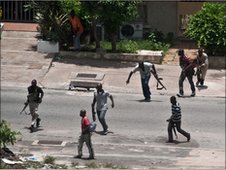 Daniel Howden reports for The Independent of London:
Daniel Howden reports for The Independent of London:
What began as the week when Laurent Gbagbo would finally concede defeat ended with the Ivory Coast strongman defying the world from his bunker in Abidjan. After watching his area of control shrink to only a few pockets of the lagoon city, his forces pushed back dramatically overnight on Friday with an assault on the French ambassador's residence.
AFP reported yesterday that Abidjan's Golf Hotel, headquarters of the internationally recognised President-elect, Alassane Ouattara, had come under attack. The UN evacuated 17 British citizens from the high commissioner's residence, which is close to the Gbagbo compound.
See also Ivory Coast: An Introduction to the Conflict (Purefoy)
The heavy weapons that had supposedly been destroyed in joint UN and French air strikes re-emerged as Gbagbo loyalists retook some ground. Arrayed against the 65-year-old loser of November's election are the combined might of the French Operation Licorne (Unicorn) force, UN peacekeepers and Mr Ouattara's ragtag army.
The violent standoff has created its own tale of two cities: each day the commercial capital seems poised to return to normal but at night the shooting starts and everything becomes uncertain.
It is not a war with a single frontline. The complications of Abidjan's lagoon is matched by the complex of alliances that rule its neighbourhoods. In the south of the city, the long queues for food outside the only working supermarket show the struggle to return to normality.
Even in the southern zone four district, The Independent on Sunday counted six dead bodies on the roadside. In many areas, the boys manning the barricades owe their allegiance to neither of the presidential rivals, whose campaign posters still haunt the city. They are neighbourhood defence forces set up to hold off militias.
After months of simmering tension, numerous attacks on civilians and near total looting of Abidjan there is a complete breakdown of trust. The civilian deaths were the pretext for air strikes by French and UN helicopters last week. It was hoped that Mr Gbagbo could be cordoned off and starved like a "rat". But progress has been viciously uneven. The one-time hub of West Africa has witnessed ethnic strife stoked by a political elite that has grown wealthy and cynical on the country's cocoa riches.
Mr Gbagbo's troops are thought to number fewer than 1,000 but their expected capitulation has not materialised. Unconfirmed reports suggested they were being assisted by Angolan mercenaries. The rump of the former president's troops consists of Republican Guards who have held on to three disconnected pockets of the city.
France responded to Friday's attack on its ambassador's residence by sending repeated helicopter sorties over the Cacody area where Mr Gbagbo's forces are guarding the entrance to his bunker. Witnesses said there was only sporadic firing. French forces confined themselves to aerial patrols.
The reality of the stalemate becomes clear north of the Charles de Gaulle Bridge in the city's war-torn business district. It is home to the state broadcaster, RTI, which has been the mouthpiece for relentless propaganda in the four months since Mr Gbagbo lost the election to his northern, Muslim, opponent Mr Ouattara. RTI has been telling Ivorians for years that Mr Ouattara, a former IMF economist, is a "foreigner" and a Western stooge. On Friday afternoon it came back on air, after an absence of several days, to tell viewers that Mr Gbagbo was fighting an anti-colonial war against the "genocidal" French and UN forces.
Outside the broadcaster's headquarters yesterday, heavily armed Gbagbo soldiers showed that the station was back under his control. In the empty, tree-lined avenues, the birdsong was interrupted by occasional volleys of heavy gunfire.
A French patrol that entered the area to rescue foreign nationals was confronted by drunken Ivorian soldiers in flip-flops. Shouting insults, one of them approached a French armoured car saying: "You should leave here. We don't want the French. France has betrayed us, it has killed my children." Waving an assault rifle he was joined by six other soldiers. "This is my county and I will die for it," he added.